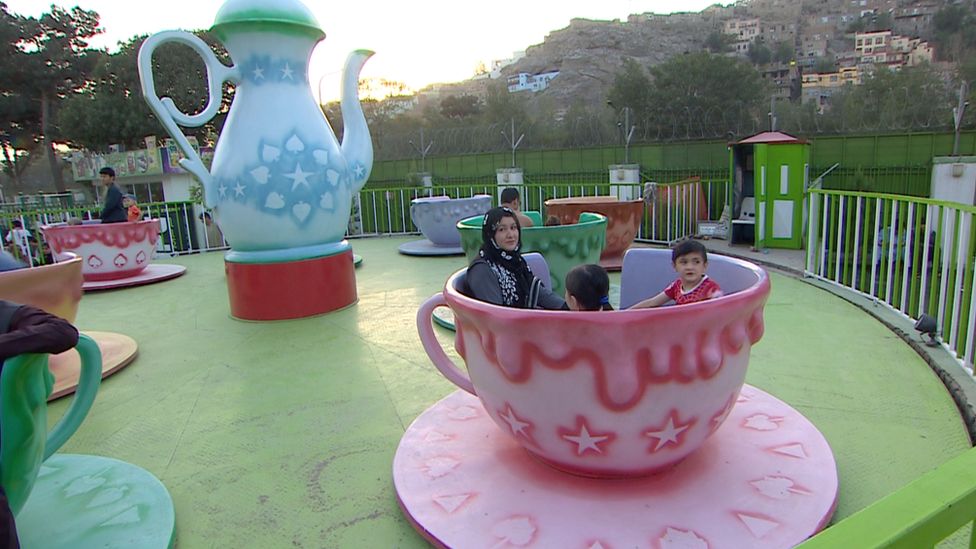Kabul families struggle to smile amid rising violence
- Published

The entrance to the City Park fairground in the Afghan capital Kabul is jam-packed. People are moving impatiently through the spiralling queue to the ticket booth.
Inside the fairground there is a candyfloss stand and a sandwich and French-fries kiosk where another long queue is forming.
It is the weekend and families have come out in droves with their little ones.
The park is buzzing with the music from the rides and the voices of excited children.
Young boys and girls were rushing to get a place on the rides, their parents following them with tickets.
Hosnia Abdullah, 27, got into the teacup ride with her two children. It has been months since she has taken them out to play.
This is a rare visit to the fairground. Security in Kabul has deteriorated significantly in the past few months with August seeing the most intense number of attacks on the capital.
"When they are not in school, I keep them home. We may visit family and friends from time to time but we stay indoors," Hosnia told me as we sat on a grass patch.
Hosnia is a former Afghan refugee, having returned from Iran 10 years ago with her husband to start a new life and a family.
She had hoped that, with the fall of the Taliban and the appointment of a new leader, she had a chance of a better, more stable, life.
"When we came back, things were starting to get better. When President [Hamid] Karzai was here, it was good. We had some security," she said.
"But now it's getting worse. Every time my husband or children leave the house I pray to God that they come back safe, but I don't know if they will."
President Ashraf Ghani and his government are in a very tight spot.
The Afghan leader took a political gamble when he reached out to neighbouring Pakistan to bring the Taliban to the negotiating table.
Pakistan has long been accused of harbouring and supporting the insurgents, something it has always denied.
But after a first round of preliminary talks in the hill town of Muree, near Islamabad, the death of the Taliban's fugitive leader Mullah Omar was announced in July.
Talks were then suspended and the attacks on Kabul intensified.
"Nowadays I feel like I want to escape from my country. I want to leave here for my children, not for myself, just for a better life for them," said Hosnia, pointing at her nine-year-old daughter, Nazani, and six-year-old son, Nasser.
"I don't see a future here if the situation remains like this. Every day bombings, every day worrying about my husband and children. I don't think this is a normal life."
A city on edge
But the atmosphere inside the fairground seems deceptively normal.
The reality of the situation in Kabul hits you when you step out on to the streets. This is a city on edge.
Security has been stepped up after a spate of attacks killed dozens in recent weeks. Most of them were claimed by the Taliban.
Fifty people were killed when three attacks rocked Kabul in less than 24 hours. Two days later, an Afghan police checkpoint was targeted near the entrance of Kabul international airport.
Last week, three civilian US contractors were killed when a suicide attack targeted a Nato convoy.
Observers say the latest surge in violence is a result of a power struggle within the Taliban, with the new leader Mullah Akhtar Mansoor being challenged by other factions.
Officials here believe that this is the new Taliban chief's way of showing that the militants are powerful and can still hit the capital.
Kabul Police chief Lt Gen Abdul Rahman Rahimi says he expects more attacks.
"The militants are hitting the capital more frequently now because they know if anything happened in Kabul the media will cover it. I expect more attacks any time, any place," he said.
"We're working day and night to bring security to the people here."
In a bustling part of Kabul I meet 18-year-old Sahar Qadiri. She is a first-year law student, studying in a private institute.
Sahar said that despite the violence she does not want to leave.
"I have to live here. This is my country. I have so many goals in my life. I want to study hard to become a lawyer," she said.
"But it's a bad situation here at the moment with these suicide attacks. Most of those who are dying are young civilians.
"They also wanted to study and work. Life here is so difficult, but I pray that one day we'll have security here."
Sahar goes to classes six days a week, days which have lately been marred by shootings and suicide bombings. But she said that dealing with this has become part of her routine now.
"We got used to it, there's always a suicide attack or a blast here. Whenever I go out, I don't know whether I'll make it back home alive. But I am continuing my studies and whatever happens - happens," she says.